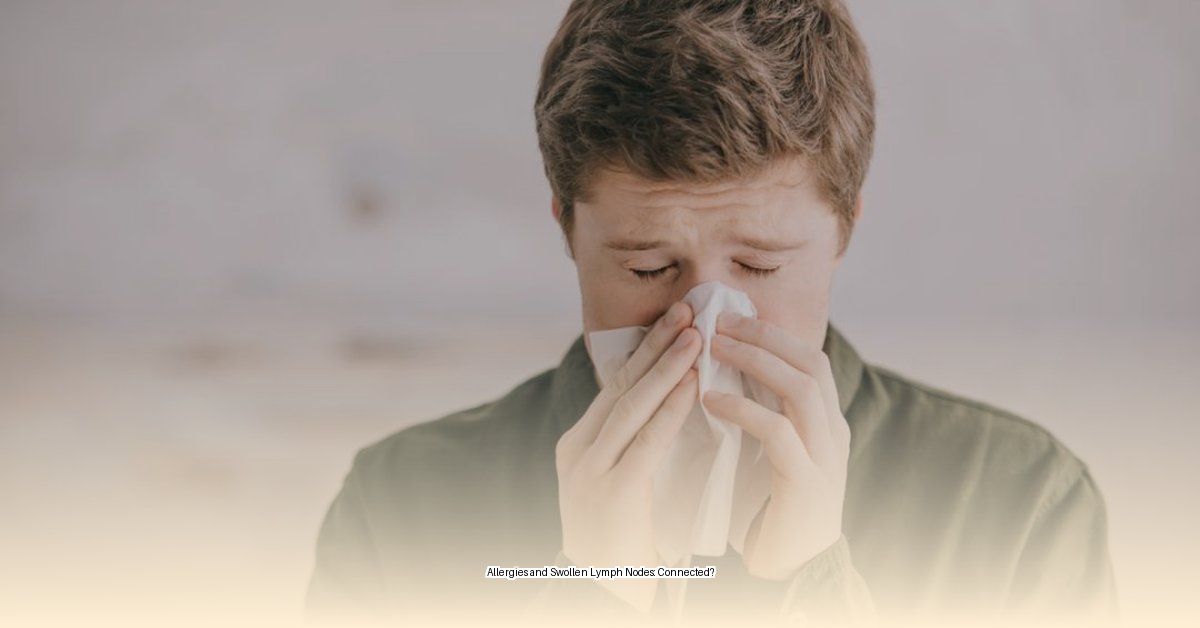Decoding the Link Between Allergies and Swollen Glands
Ever notice those little bumps in your neck when you’re battling allergies? They’re your lymph nodes, and while allergies themselves don’t directly cause them to swell, there’s a definite connection. Let’s unravel this common health mystery.
Understanding Allergies: The Immune System’s Overreaction
Your immune system is like a highly trained security force, constantly scanning for threats. Allergies occur when this force mistakenly identifies a harmless substance (like pollen, pet dander, or certain foods) as dangerous. This triggers a cascade of reactions, including the release of histamine, leading to those familiar allergy symptoms: sneezing, itching, runny nose, and watery eyes.
Lymph Nodes: The Body’s Tiny Filters
Lymph nodes are small, bean-shaped structures scattered throughout your body, acting like tiny filters for your lymphatic system. They’re packed with immune cells that trap bacteria, viruses, and other unwanted particles, preventing them from spreading and causing illness. They’re essential for keeping you healthy.
The Connection: It’s All About Infection
So, where do swollen lymph nodes come in? Allergies, by themselves, don’t typically cause significant lymph node swelling. Instead, they can pave the way for infections that do. Here’s how:
- Weakened Defenses: When your immune system is busy fighting allergens, it can be less effective at fending off actual threats like viruses and bacteria.
- Inflammation: Allergies cause inflammation, which can sometimes irritate nearby lymph nodes, leading to minor swelling.
- Secondary Infections: A stuffy nose from allergies creates a perfect breeding ground for bacteria, potentially leading to a sinus infection. It’s this infection, not the allergy itself, that triggers noticeable lymph node swelling. Your lymph nodes swell as they work overtime to combat the infection.
When to See a Doctor: Recognizing the Red Flags
Some lymph node swelling during allergy season is normal. However, it’s crucial to know when to seek medical attention. Consult a doctor if:
- Painful Swelling: The nodes are tender and painful to the touch.
- Significant Size: The nodes are larger than a pea.
- Persistent Swelling: The swelling lasts longer than two weeks or keeps recurring.
- Accompanying Symptoms: You experience fever, chills, night sweats, unexplained weight loss, or persistent fatigue along with the swollen lymph nodes.
- Rapid Growth: The nodes are increasing in size rapidly.
- Hard or Fixed Nodes: The nodes feel hard or immobile beneath the skin.
These signs may indicate a more serious infection or other underlying condition requiring medical evaluation.
Other Potential Causes: It’s Not Always Allergies
Swollen lymph nodes can be caused by a variety of factors besides allergies and related infections. These include other viral or bacterial infections (like strep throat or ear infections), autoimmune disorders (like lupus or rheumatoid arthritis), and in rare cases, certain types of cancer. A doctor can help determine the cause and recommend the appropriate treatment.
Managing Allergies for Healthier Lymph Nodes
The best way to minimize allergy-related lymph node swelling is to manage your allergies effectively. This might include:
- Over-the-Counter Medications: Antihistamines and decongestants can help relieve allergy symptoms.
- Prescription Medications: For more severe allergies, your doctor might prescribe stronger medications like nasal corticosteroids or leukotriene inhibitors.
- Immunotherapy (Allergy Shots): This treatment can help desensitize your immune system to allergens over time.
- Lifestyle Changes: Avoiding known allergy triggers, using air filters, and practicing good hygiene can help reduce your exposure to allergens.
The Bottom Line: A Nuanced Relationship
Allergies and swollen lymph nodes have a complex, indirect relationship. While allergies themselves don’t usually cause the swelling directly, they can create an environment conducive to infections that do cause swelling. Understanding this connection, recognizing the warning signs, and managing your allergies proactively are crucial for maintaining your health. Remember, this information is for educational purposes and doesn’t replace professional medical advice. Always consult with a doctor for any health concerns.










